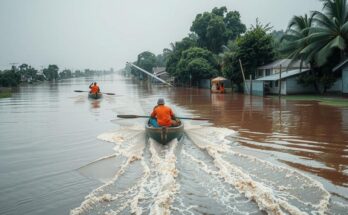The U.N. summit in Riyadh highlighted the severe issue of land degradation and desertification, with over 75% of the world’s land now drier than in previous decades. Projections indicate that nearly five billion people could be affected by increasing aridity by the century’s end. Solutions discussed include improved land management, efficient water use, and increased financial support from affluent nations. The report emphasizes the possibility of recovery through sustained adaptation efforts.
In recent discussions held at the U.N. summit in Riyadh, Saudi Arabia, nations are addressing the alarming issue of land degradation and desertification affecting much of the Earth. A significant report released by the United Nations indicates that since 1970, over 75% of the world’s land has experienced drier conditions significantly impacting ecosystems and agricultural productivity. Climate change driven by human activity, coupled with declining water availability and deforestation, poses severe threats to wildlife and human populations alike.
The report presents dire projections suggesting that if current trends continue, nearly five billion people could face the consequences of increased aridity by the end of the century, exacerbated by rising global temperatures. Many parts of Europe, the western United States, and substantial areas in Brazil, eastern Asia, and central Africa are expected to experience significantly drier conditions. Notably, U.N. officials have warned of potentially catastrophic impacts on water access and food security, leading to increased migration and socioeconomic instability in the affected regions.
During the ongoing talks, negotiators are exploring solutions for enhancing global responses to drought and land degradation. A primary area of contention revolves around whether wealthy nations should provide financial support for drought mitigation initiatives worldwide. Innovative approaches to land management, efficient water use, and large-scale reforestation projects are critical pathways suggested for improving resilience against increasingly frequent droughts.
Despite the daunting challenges, the U.N. report emphasizes the potential for recovery, provided that adaptive and sustainable practices are rigorously implemented. This includes the promotion of crops that require less water, adoption of advanced irrigation techniques, and significant investments in monitoring and forecasting systems to anticipate water shortages. A commitment from nations to coordinate their efforts is essential for overcoming the hurdles presented by desertification and climate change.
Land degradation is an escalating concern attributed primarily to human-induced climate change, which has been intensifying since the 1970s. The phenomenon of desertification not only threatens natural habitats but also jeopardizes food security and economic stability across various regions of the world. As climate patterns shift, societies are forced to confront the reality of diminishing resources, exacerbating tensions related to migration and development. Recognizing this critical issue, the United Nations has initiated discussions aimed at strategizing responses to the impending global water crisis and its broader implications.
The recent U.N. summit in Riyadh has underscored the urgent need for collaborative international efforts to combat desertification and mitigate the consequences of climate change. While the challenges presented by drying lands are significant, the potential for recovery through sustainable practices and efficient resource management offers a glimmer of hope. Nations must devise strategic partnerships and funding mechanisms to ensure that vulnerable communities receive the support required to adapt to changing environmental conditions and attain long-term resilience.
Original Source: apnews.com




